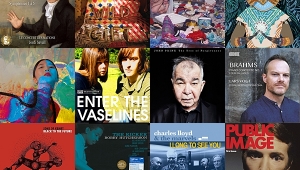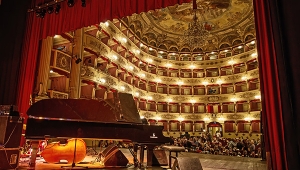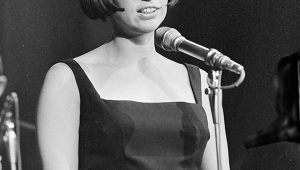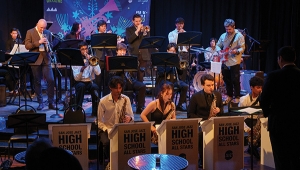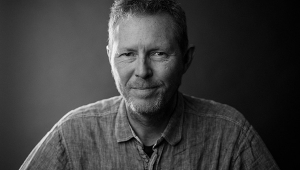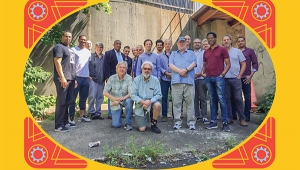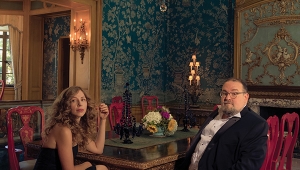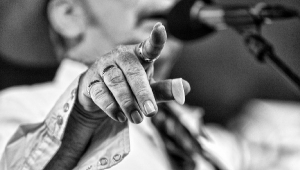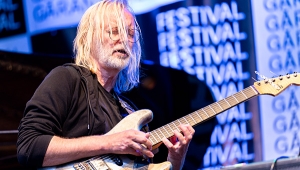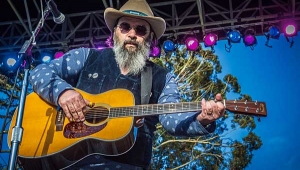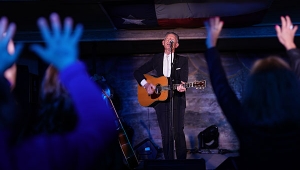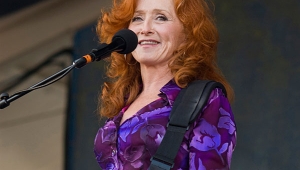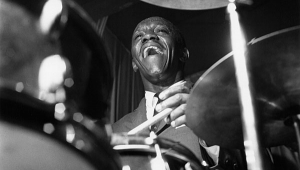| Columns Retired Columns & Blogs |
Chad Kassem Brings the Blues to Salina
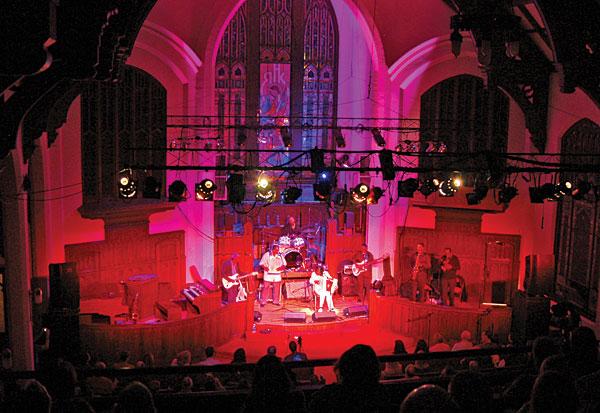
Up on the old church altar, under the ceiling's massive and ornate wooden arches, in front of an array of stained glass whose center panel has been replaced with a modern rendering of a trio of bluesmen, singer and harmonica player Phil Wiggins and singer-guitarist Corey Harris are nearing the end of their set. Wiggins pauses, looks at his watch, and smiles.
"Time flies when you're playing blues in a church."
Blues in the Church of Chad. Most audiophiles, and especially the readers of this magazine, know that, out on the Smoky Hill River plains of Kansas, in the town of Salina, a determined and very canny young man named Chad Kassem has built himself an audiophile empire. Kassem claims that one wing of his now sprawling business, the online record store Acoustic Sounds, is "the world's largest supplier of audiophile recordings in the world." He also sells new high-end audio gear; bankrolls two record labels, APO (for new projects) and Analogue Productions (for reissues); sells used LPs via the Vinyl Vault section of www.acousticsounds.com; and has now built the largest state-of-the-art plant for plating and pressing LPs to open anywhere in the world in many years. Many who know Kassem's story have also attended Blues Masters at the Crossroads, the two-day blues festival that he throws every October in Blue Heaven Studios, the former First Christian Church of Salina, which he's converted into a combination recording studio and performance venue.
Somehow, in a decade and a half as Stereophile's music editor, I'd never made the pilgrimage to Salina. Never tasted the world-class crawfish étouffée that Kassem hires Cajun cooks to labor over in the church's basement kitchen as free musician fare. Never been awestruck by his football-field–sized warehouse stuffed with SACDs and audiophile LPs, and silently wondered how much plunder I could sneak into my New York apartment before my wife called the divorce lawyer or Bellevue. I'd never seen or heard a 20-year-old blues prodigy like guitarist Marquise Knox put on the kind of knockout performance that maxed out the memory card of my digital camera in less than 10 minutes. Last but not least, I'd never spent quality time with the inimitable Roy Head, the 69-year-old white R&B singer who years ago decided, just before meeting Elvis Presley for the first time, that the best way to make a lasting impression would be to bite him on the leg. It worked. (See "Aural Robert" elsewhere in this issue.) "I really like him," Head says of Kassem. "He's a record-company guy, but dammit, I trust him."
Most important, I'd never seen Kassem (pronounced Kah-sem) on his home ice, patiently working with musicians as they repeatedly flubbed direct-to-disc recordings; making sure everyone gets downstairs to the food; or solving the myriad mini-crises that buzz like flies around big events. Most impressive, through it all he found time to sit in the front pew and be a blues fan: enthusiastically applauding performers, or jumping up to joyously dance with his beautiful three year old daughter, Jasmine.
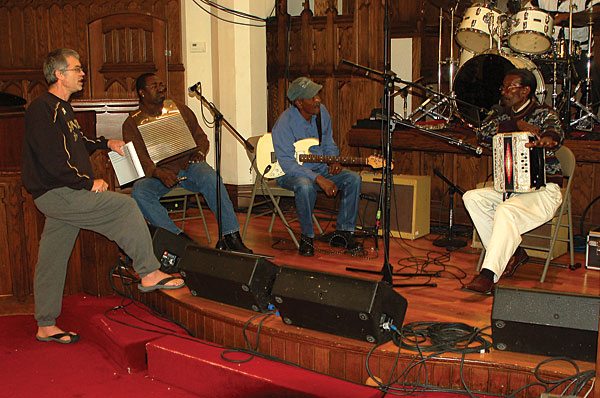
Part of the reason I'd never been to the annual Blues Masters at the Crossroads is that Salina is only slightly closer to New York City than Alaska—and to Alaska, at least, there's a direct flight. After two flights and a two-hour drive, I arrive in time to survey Salina's Kassem quarter. Handsome offices, that massive warehouse complete with new $70,000 kitchen and bathroom area, and the new LP works, Quality Record Pressings (QRP), whose air-locked clean rooms, optimal layout, and mass of rebuilt and yet-to-be-rebuilt SMT, Toolex Alpha, and Finebuilt presses left me gasping for adjectives. (For more about QRP, see "Analog Corner" in the August 2011 Stereophile.) In Salina, where Lee Jeans started in 1889, Kassem and Acoustic Sounds are definitely big business.
"In Salina, it's frozen pizza, light bulbs, and Chad," one of the girls selling T-shirts in the basement of Blue Heaven Studios proudly volunteered. Tony's Pizza, which also was founded in Salina, now operates what the locals jokingly refer to as "the world's largest frozen pizza factory." The Dutch company Philips, which bills itself on its website as a "healthcare, lifestyle and lighting company" but is more famous in music circles as a key holder of the Compact Disc and CD-player patents, has a light-bulb plant on the city's southern outskirts.
Then there are the five buildings (70,000 square feet total) and 40 employees of the Acoustic Sounds empire. I was able to chat with many of the employees during the Blues Masters at the Crossroads weekend. While there was some of the usual background static that all workers have with their jobs, none of those I spoke to had truly negative words to say about the boss.
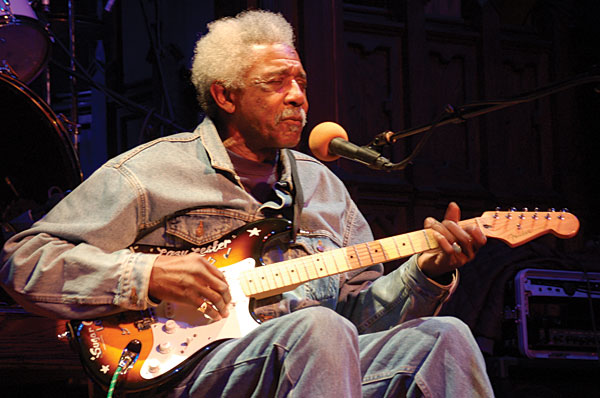
When I tell the frenetic Kassem this during a 10-ten minute office tour that he gives in two, he smiles. "You know what that comes from?" he says in his laconic Louisiana accent, "A daily beat-down. No, it's their passion too." We walked through offices that are a temple to blues, roots, and rock'n'roll music—at every turn are shelves of vinyl, music memorabilia, and audio gear. Kassem's framing bills must be off the charts—the interior walls of the building are covered with framed posters, album covers, and prints of images by such famed rock photographers as Jim Marshall and Baron Wolman. Kassem whips open the door of a small anteroom to show me two immaculate specimens of recording history past: Edison Gem and Edison Fireside cylinder players. In the used-LP section, I wisely stayed as aloof as humanly possible—though I managed to glimpse, however briefly, an original Mobile Fidelity Sound Lab pressing of R.E.M.'s debut, Murmur, in sweet shape ($175), and a copy of the Rondolette Records compilation Famous Film Favorites (no price) with a fetching shot of Betty Page on the cover.
Across the street, at the LP/CD/Gear warehouse, Brad Hoppock, the warehouse manager, rubs red eyes that betray he's attended one of the legendary Blues Masters after-show jam sessions at the local Ramada Inn, where alcohol is liberally consumed (only bottled water and soft drinks are available at the church). He agrees with Kassem's comment about his employees. "I grew up here and sort of knew this place was in town, but working here . . . around all this [points to shelves stacked with LPs], it's a dream come true."
- Log in or register to post comments
